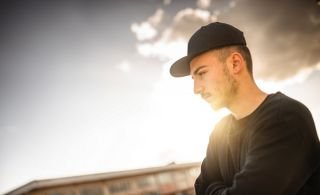Our series of pre-shot checklists continues with a look at some of the best camera settings for outdoor portrait photography. While variable lighting conditions can present challenges, you can still set up your camera in advance… here's how. Even though you can't predict the exact lighting conditions that you'll be working in when you plan a shoot outdoors, having some basic settings pre-set on your camera will help with your outdoor portrait shots.
Things you can pre-set
For most outdoor portraits you'll find that ISO200 will give you high-quality images, and still enable you to use a shutter speed fast enough to avoid blur from camera shake or subject movement. Just like when you're taking window-lit portraits, you should set your camera to aperture-priority mode as this will give you complete control over the depth of field. Using a wide aperture such as f/2.8 will help to blur the background, while a narrower aperture such as f/8 will keep more of the scene sharp. For most portraits you will want to blur the background, so you can set the aperture to f/2.8 or f/4, although you may need to adjust this when you are shooting to give more or less depth of field. As long as the subject isn't likely to be moving around you should set the focusing mode to single-servo, and select the single-point area mode. Then, all you need to do on the day is position the focus point over the face or eyes of your subject.
Settings to change on the day
If you position your subject to the left or right of your frame during your shoot, you may find that you can't select an AF point that corresponds to their position within the frame. In these situations you will need to either switch to manual focus, or use focus lock. In AF-S focus mode, all you need to do to use focus lock is position the subject so they 're in the selected focus point area, then press the shutter release half-way until the focus indicator appears in the viewfinder. Then, while still half-pressing the shutter release, recompose your shot and fully press the shutter release to take your shot. You may also need to adjust the exposure, depending on the lighting conditions that you find yourself shooting in. In darker conditions you may need to increase the ISO to enable you to set a shutter speed fast enough to avoid camera shake, and blur from subject movement. You will also need to set some exposure compensation if there is a light or dark background: if the background is much darker than the subject you will need to set exposure compensation to a negative value, such as -1, to avoid the subject being over-exposed, while if it's brighter than the subject you should use a positive value, such as +1, or everything will come out dark.
Fill-in flash
Shooting in bright sunlight can produce harsh shadows on faces, so try using flash to reduce them. The easiest way to do this is to set the flash to TTL automatic exposure, which will adjust its power automatically. Use exposure compensation to adjust the overall exposure.
Typical camera settings for window-lit portraits
File format
RAW
Exposure mode
Aperture-priority
Aperture
f/4
ISO
200
Shutter speed
1/200 sec
Focus mode
Single servo
Drive mode
Single shot
White balance
Daylight

Stolen from here:
http://www.techradar.com/us/how-to/photography-video-capture/cameras/best-camera-settings-for-outdoor-portrait-photography-1321052
Thanks for these tips! Any recommendations you might have in regards to a specific camera I can use? I've been looking into Allied Vision cameras as well as ids cameras for purchase. Any recommendations you might have? Thanks :)